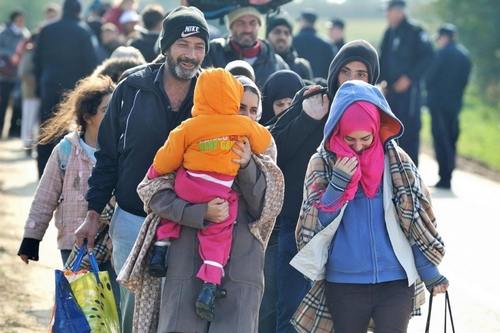Strong compacts for refugees and migrants more urgent than ever
Joint statement by UN Special Representative for International Migration and UN High Commissioner for Refugees.
Strong compacts for refugees and migrants more urgent than ever
Faced with record numbers of people displaced by conflict and persecution, and the rise and complexity of international migration, on September 20, two senior UN officials appealed to governments to ensure the new global ‘compacts’ on refugees and migrants are robust, with the rights of people on the move at their coreo.

They came in unending lines, the very old and the very young—hundreds of thousands of Middle East migrants and refugees on the Balkan Route from southern to northern Europe via Croatia in 2015.
The call was made by Special Representative for International Migration (SRSG) Louise Arbour and UN High Commissioner for Refugees Filippo Grandi at a high-level meeting, co-hosted by the two, at the United Nations in New York, on September 20. The meeting marked the first anniversary of the historic New York Declaration for Refugees and Migrants – a landmark agreement adopted by all 193 UN Member States to enhance the protection of people on the move.
The Declaration provides for the negotiation of a global compact for safe, orderly and regular migration to be adopted in 2018, and for the UN High Commissioner for Refugees to propose a global compact specific to refugees in his annual report to the UN General Assembly next year.
The successful adoption of each compact will help to reinforce the objectives of the other. Better managed migration contributes to a conducive environment for the effective implementation of asylum regimes. At the same time, greater international solidarity and more comprehensive responses to refugee flows encourages a tolerant and more receptive environment for all persons on the move.
“Our ability to better manage human mobility rests on both compacts being as strong as possible: widely supported by member states and with the needs of the most vulnerable firmly at their heart,” said SRSG Louise Arbour who has been appointed by the UN Secretary-General to work with governments as they develop the first-ever compact on international migration, in cooperation with the International Organization for Migration (IOM).
The UN High Commissioner for Refugees Filippo Grandi reminded governments that, a year ago, they had recommitted to the Refugee Convention and the international protection regime, which sets out the fundamental rights of refugees to seek safety in other countries and be received with care and dignity. The new mechanisms, he emphasized, must enhance existing systems and more equitably share responsibility for hosting the world’s refugees and helping them rebuild their lives.
“The scope and severity of global refugee crises which led to the adoption of the Declaration a year ago have not abated one bit. Refugees are fleeing for their lives in even larger numbers, to some of the poorest countries in the world. We have a collective and moral responsibility to strengthen our response to refugee movements, while redoubling efforts to address their causes,” said Grandi.
“The latest exodus from Myanmar’s Rakhine state – over 400,000 in the last few weeks – is a chilling reminder of the catastrophic human consequences that ensue when the conflicts and human rights violations that compel refugees to flee their homes go unchecked,” said Grandi.
Updating governments, international organizations and civil society on the process to develop a global compact on refugees, Grandi noted solid progress had been made with, for example, the related Comprehensive Refugee Response Framework (CRRF) being applied in 11 countries in Africa and the Americas. The lessons learned from this experience will be fed back into the development of the global compact on refugees.
“While solid progress is underway, it is crucial that pledges put forward by governments are honoured by additional funding, new resettlement places and more opportunities for refugees in host communities,” said Grandi.
The global compact for safe, orderly and regular migration will seek to enhance international cooperation on cross-border mobility, maximising its benefits for all involved. It will aim to help the vulnerable, match labour needs with migrants’ skills – including those of women migrants who play a key role in the development of the societies in which they live – and tackle the drivers of irregular migration. In the past six months, a process of member state and civil society consultations have taken place, to be followed, from early next year, by inter-governmental negotiations on a draft compact that will be adopted at an international conference in the fall of 2018.
Arbour urged governments to ensure the global migration compact is grounded in certain realities – including recognition that cross-border movements are likely to rise and evolve due to complex factors such as demographics, climate change, modern communication, work patterns, as well as other economic factors and human aspirations.
“The reality is that migration is a net positive to migrants and the communities from which they come and in which they settle, with most moving in a well-regulated way,” Arbour said.
“Discourse which is detached from this reality, grounded in stereotypes and predicated on fear, a discourse which demonises migrants or disparages their contributions not only risks fuelling intolerance but it also obscures the very real challenges we face today,” she said.
Source: United Nations High Commissioner for Refugees
- 291 reads
Human Rights
Fostering a More Humane World: The 28th Eurasian Economic Summi

Conscience, Hope, and Action: Keys to Global Peace and Sustainability

Ringing FOWPAL’s Peace Bell for the World:Nobel Peace Prize Laureates’ Visions and Actions

Protecting the World’s Cultural Diversity for a Sustainable Future

Puppet Show I International Friendship Day 2020

